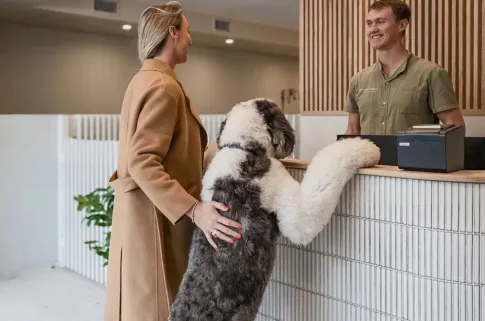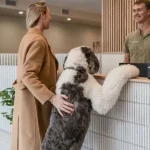A happy, well-adjusted dog doesn’t happen by chance. It’s the result of care, consistency, and positive experiences. Socialisation plays a major role in shaping a dog’s behaviour and confidence from puppyhood to adulthood. For pet owners who want to give their companions the best start, The Dog Social provides structured, engaging environments designed to help dogs thrive through play, training, and community interaction.
Also Read: Guide to Full-Size Carousels & Ferris Wheels for Amusement Parks
Understanding Dog Socialisation
Socialisation is the process of teaching dogs how to interact appropriately with other animals, people, and new environments. It helps them understand the world around them and react calmly to everyday situations. A well-socialised dog is less likely to show fear, aggression, or anxiety when faced with unfamiliar sights and sounds.
For puppies, the socialisation window is especially critical, typically between 3 and 16 weeks of age. During this time, positive experiences build the foundation for a lifetime of confident behaviour. However, socialisation isn’t just for puppies. Adult dogs can also benefit greatly from structured social experiences, particularly those who may have missed early training or are new to certain settings.
The Benefits of Proper Socialisation
Dogs that are well socialised tend to be happier, healthier, and easier to manage. Socialisation provides both mental and physical benefits, such as:
- Improved confidence – Dogs learn to navigate new environments without fear.
- Better behaviour – Exposure to other dogs and people helps reduce reactivity and anxiety.
- Enhanced obedience – Positive group experiences make dogs more responsive to commands.
- Reduced stress – Social dogs adapt more easily to changes such as travel, grooming, or vet visits.
- Physical exercise – Playtime with other dogs promotes healthy activity levels and fitness.
When socialisation is done right, it strengthens the bond between dog and owner while making life together more enjoyable.
Why Professional Socialisation Programs Work Best
While casual interactions at parks or neighbourhood walks can help, structured programs deliver more consistent results. Professional trainers and handlers understand canine body language, group dynamics, and how to safely introduce dogs to each other.
At The Dog Social, sessions are carefully supervised to ensure every dog feels safe and engaged. Handlers monitor play styles, energy levels, and comfort zones to prevent conflicts and encourage positive interaction. This structured environment allows dogs to build confidence at their own pace without fear or pressure.
What Makes The Dog Social Different
The Dog Social isn’t just about letting dogs play. It’s about helping them learn, grow, and build lifelong social skills. Their programs combine play-based training with behaviour reinforcement, focusing on trust and balance.
Every session is tailored to the dog’s temperament and stage of development. Puppies learn gentle play and early obedience cues, while adult dogs build confidence through advanced social scenarios. Group sizes are kept manageable so that each dog receives personal attention from trained professionals.
The result is a safe, enriching environment where dogs can express themselves freely while developing vital skills that translate to better behaviour at home and in public.
The Role of Play in Learning
Play is one of the most effective ways for dogs to learn. Through play, they develop coordination, communication, and social awareness. Dogs naturally use play to establish boundaries and test limits. When guided properly, it becomes an opportunity to teach positive behaviours such as sharing toys, waiting turns, and responding to recall commands.
Structured play sessions at The Dog Social provide controlled freedom. Dogs enjoy fun and excitement while handlers ensure interactions remain safe and productive. This balance allows dogs to associate play with positive outcomes, which supports long-term behavioural development.
Building Confidence in Shy or Reactive Dogs
Not every dog is outgoing or social by nature. Some may struggle with anxiety, fear, or previous negative experiences. The Dog Social takes a patient, compassionate approach to these dogs, introducing them slowly to calm companions and gradually increasing exposure.
By observing each dog’s comfort level, trainers adjust sessions to build confidence without overwhelming them. Over time, even the most reserved dogs learn to relax and engage, making daily life easier for both the pet and the owner.
Socialisation for Puppies
For puppies, socialisation sets the stage for a lifetime of good manners and balanced behaviour. Early exposure to other dogs, people, and environments teaches them how to handle excitement, frustration, and curiosity in a healthy way.
Puppy programs at The Dog Social focus on positive reinforcement, short sessions, and gentle introductions. Puppies learn to play politely, interact with confidence, and respond to cues even in stimulating settings. These early lessons often prevent behavioural issues later in life, such as fearfulness or excessive barking.
Benefits for Owners
Dog socialisation isn’t just about the dogs. It benefits owners too. When dogs behave calmly in public and around other pets, everyday activities like walks, café visits, and travel become far more enjoyable.
The Dog Social also fosters a supportive community of like-minded owners. Participants share experiences, learn training tips, and develop stronger bonds with their dogs. Many owners find that regular attendance not only improves their dog’s behaviour but also deepens their own understanding of canine communication.
Real Success Stories
Many owners who join The Dog Social notice significant improvements after only a few sessions. One example involved a young rescue dog that had developed reactivity toward other dogs after a negative experience. Through gradual exposure, guided play, and consistent training, the dog learned to relax and engage appropriately.
In another case, a shy puppy who once hid behind its owner’s legs became a confident, playful companion who now enjoys group activities. These transformations highlight how professional guidance and consistent practice can completely change a dog’s outlook on social interactions.
Creating a Safe and Positive Environment
Safety is always the top priority at The Dog Social. All dogs are assessed before joining to ensure they are up to date on vaccinations and suitable for group participation. Supervision is continuous, and sessions are structured to prevent overstimulation or conflict.
This controlled environment allows dogs to explore and interact safely, building trust not only with others but also with their handlers. Every success, no matter how small, is celebrated, reinforcing confidence and positive behaviour.
The Long-Term Value of Socialisation
Socialisation is not a one-time activity. It’s an ongoing process that evolves as dogs mature and face new experiences. Regular participation in structured sessions helps maintain confidence and adaptability throughout a dog’s life.
Well-socialised dogs are easier to train, safer to handle, and more enjoyable companions. They cope better with change, recover quickly from stress, and are less prone to developing anxiety-driven behaviours. Investing in consistent socialisation provides lifelong benefits that extend far beyond obedience.
Conclusion
Socialisation is one of the most important gifts you can give your dog. By enrolling with The Dog Social, owners ensure their pets receive professional guidance, safe environments, and enriching experiences that build confidence and companionship.
Through structured play, positive reinforcement, and expert supervision, The Dog Social helps every dog, whether a playful puppy or a cautious adult, develop the skills needed to live a happy, balanced life.
When dogs are given the opportunity to connect, learn, and grow in the right setting, they don’t just behave better—they thrive.







